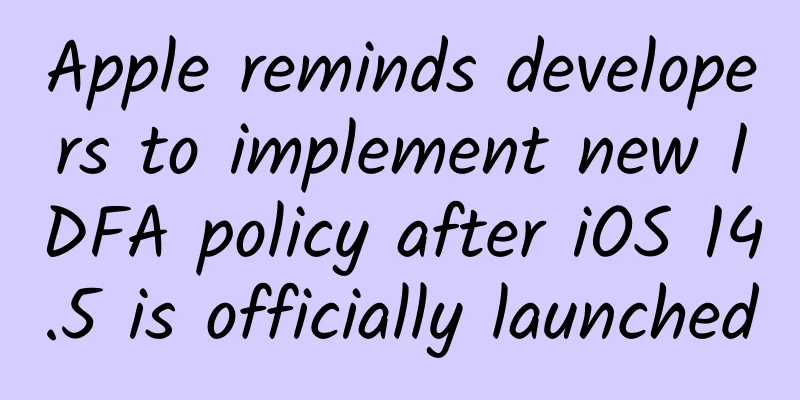Apple reminds developers to implement new IDFA policy after iOS 14.5 is officially launched

|
On the morning of April 6, Apple reminded developers today that it will begin to implement the new IDFA policy after the release of iOS 14.5, iPadOS 14.5, and tvOS 14.5. After the release of these system updates, developers will need to obtain explicit permission to access the advertising identifier (IDFA) on the device so that users can be tracked across apps and websites for ad targeting. IDFA is an advertising tracking identifier of Apple. It has nothing to do with hardware, which allows businesses to monitor advertising effects without letting them know users' personal privacy. However, since iOS 14.5, the IDFA switch will be turned on only with user permission. This approach will certainly be welcomed by users, but it will also have an impact on Internet advertising. Apple said: Make sure your app is ready for iOS 14.5, iPadOS 14.5, and tvOS 14.5. In the upcoming public release, all apps must use the AppTrackingTransparency framework to request permission from users to track or access their device's advertising identifier. You can enable tracking only after you get the user's permission, otherwise the device's advertising identifier value will be all zeros and you may not be able to track them. IDFA will become a manually selected option, which will affect the Internet advertising business. When submitting your app for review, any other form of tracking (for example, by name or email address) must be declared in the App Store Privacy Information section of the product page and can only be performed with permission granted through AppTrackingTransparency. Per App Store Review Guidelines 5.1.2(i), you will also need to make this clear in the system prompt to explain why you are tracking users. These requirements apply to all apps running on the official version of iOS 14.5, iPadOS 14.5, and tvOS 14.5. As a reminder, other derivative methods of collecting device and usage data still violate the Apple Developer Program License Agreement. The last sentence is about CAID. In the context of IDFA being closed by default, the China Advertising Association launched the CAID (CAA Advertising ID) solution, but it is obvious that this solution has not been recognized by Apple. Apple warned developers in early March not to use alternative methods to collect user data for tracking purposes, and last week rejected some app updates from developers using mobile measurement company Adjust's SDK, which uses data such as software version and payment level to keep track of users. In early September 2020, Apple announced that it would postpone the release of new privacy regulations for IDFA until early 2021 to help developers reserve more time to cope with IDFA changes. All frameworks for app tracking transparency are in place, and some developers have begun to require users to provide IDFA access rights. When the iOS 14.5 update is released, all apps using IDFA will need to use the framework. We don’t know yet when iOS 14.5 will be released, but Apple CEO Tim Cook recently said that iOS 14.5 will be available in “just a few weeks.” |
<<: LG officially announces its exit from smartphone business
>>: Android 12 now has a device search API for third-party launchers
Recommend
Human Lunar Day丨How much do you know about it, which is so close to the Earth?
Copyright image, no permission to reprint On July...
In addition to LeTV, which other video websites are making mobile phones?
As a video website for mobile phones, LeTV is by ...
How to write a satisfactory and valuable operation and promotion plan?
More than one friend has asked me this: My boss w...
The title of the video with one million views on Bilibili deserves to be so popular!
Hello friends, I was looking for topics on Bilibi...
up to date! Information flow platform traffic ranking! What is the ranking of the platform you promote?
Do you remember how much advertising cost in Sept...
Microsoft releases standalone Android emulator to simulate multiple popular models
[[142136]] Microsoft has released the official ve...
Fried chicken with cola = high fat and high sugar? Research proves: heavy casualties of pancreatic islet cells!
When eating fried chicken, you must drink Coke! I...
Jie Jingjing of Xiaoju Energy: Accelerate intelligent innovation in the charging industry and build a high-quality service system
On September 14, the "Third Electric Vehicle...
The FF91 built by Jia Yueting will be sold in China for more than 2 million yuan. Should I buy it or a BMW i8?
Seeing that the financial crisis is difficult to ...
It is reported that NIO is considering more layoffs: some departments may lay off up to 30% of employees
Some international expansion plans, including ent...
What sense of crisis should P2P online lending have?
At the end of the year, the development of the P2...
Demonized growth, fission and community!
If you are doing marketing or in the Internet ind...
Feeling dizzy and having pain in the neck? Don't ignore it, it may not be cervical spondylosis
Mr. Li is a 45-year-old senior corporate manager....
Diao Ye: Solve this O2O equation and you will know who will die
Business has basic laws, so there is an equation ...
How to make your original articles full of useful information?
"Write articles with more substantive conten...









